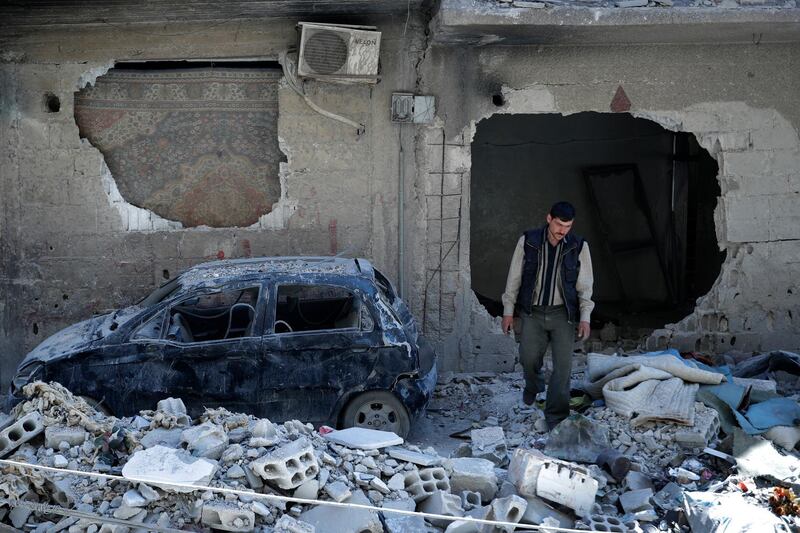If Donald Trump is following any media apart from Fox News, he must be perplexed by the reaction to his decision last week to bomb a number of sites across Syria. Barack Obama, he might note ruefully, was criticised for not responding to a chemical weapons attack – now here is the media criticising him for responding.
But the problem with the missile strikes last week was not that they attempted to deter the use of chemical weapons but that they simultaneously went too far and not far enough.
After several days of trailing a military response and with politicians in all three countries issuing tough rhetoric, the United States, Britain and France eventually adopted what some publications and broadcasters have been calling a "Goldilocks strategy" – or, as former supreme Nato commander Admiral James Stavridis told NPR earlier this week, neither too tough nor too weak.
The strikes were coordinated by the militaries of three members of the UN Security Council, who fired more than 100 missiles at targets across Syria. From one perspective, this was a tough response. It was, however, calculated to be not too tough.
A genuinely tough response could have targeted Russian or Iranian military facilities – but that might have invited a reaction, dragging all the countries further into the Syrian morass, which none of them wants.
So it was weak enough not to provoke a reaction while also seeming to draw a faint red line around the use of chemical weapons – or, as analyst HA Hellyer wrote in The National on Sunday, to send the message to the regime that it could continue killing but just by other methods.
As I wrote in these pages last week, the West cannot strike Bashar Al Assad's regime hard enough to genuinely deter it from its use of chemical weapons. The strikes have proved this, making any future use of chemical weapons expensive for the regime but not impossible to contemplate.
Because, after all, the regime has suffered no great loss from the air strikes. On the contrary, it has drawn Russia and Iran closer because both publicly warned they would defend the regime and it exposed splits between the leaders of the west and their public.
Each of the three leaders have their own reasons for attacking Syria and none have to do with Syria itself. For Mr Trump, it is looking tough on the issue in a way his predecessor did not. For Theresa May, it showed Moscow that chemical weapons attacks – such as the one her country suffered a few weeks ago – won't be tolerated. For Emmanuel Macron, it is being seen to wield influence on the world stage.
But this Goldilocks strategy by the leaders was always going to provoke a Goldilocks response from the public. And so it happened.
For some, the strikes can never go far enough. For those people, the 100 missiles can only ever be the opening salvo in a much longer battle. These analysts and politicians are dismayed by the strike for various reasons: some want to see the regime unseated by force; others want America's power in the world restored and want it done at the tip of a missile; still others want to see Israel’s power in the Middle East enhanced and desire that end by weakening its neighbours. But all agree on one thing: that a policy which limits military strikes to one day in April is doomed to fail.
On the other side is what appears to be a much larger contingent at the moment, of those for whom the strikes, limited though they were, went too far.
This was particularly noticeable in Europe, where left wing opinion has shifted, after the debacle of the Iraq war, against any intervention. From their perspective, this round of rhetoric over Syria feels very similar: the rush to a judgment call over the presence of biological or chemical weapons; the demand for weapons inspectors to go in; the threat of more attacks to come.
Rather remarkably, then, the strikes have managed to unite a broad spectrum of public opinion, from the far left, which sees in the strikes the imperialism of the US, through the mainstream, which is sceptical of another Middle Eastern war after the fabrications of Iraq, to the far right, which prefers the Assad regime and its supposed firm hand against Islamist extremists.
Worse, for the leaders, as the background to the strikes emerge, they begin to look less resolute and more self-serving.
The US and Russia, far from being adversaries, were in constant communication to ensure Russian troops were not hit. Moscow was informed of the targets in advance – which means it is beyond imagining that that information did not make its way to Damascus, and beyond imagining that the Americans did not know that the information would reach the regime.
No wonder that not a single casualty was reported by the regime. So the strikes were purely cosmetic, a vastly expensive piece of theatre. You don't have to be a pacifist or a supporter of the regime to wonder what was gained by the estimated $200 million the strikes cost, nor to ask how many Syrian refugees that astronomical sum could have clothed, fed and schooled.
After so long waiting for an international response, the results were disappointing. By adopting a Goldilocks strategy, the West has tried to implausibly square a circle: to look tough without provoking a reaction. But as the dust from the raids settle, they would do well to recall how the fairy tale actually ended. When Goldilocks left, apart from an empty bowl of porridge and a wrecked chair, the house of the bears was left exactly as it had been before.





